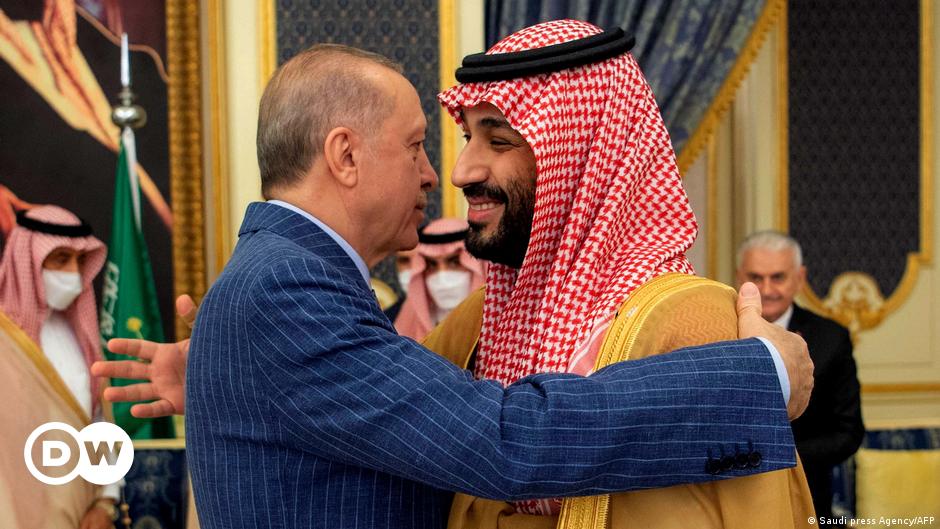
It’s rare that the visit of a head of state has a whole region holding its breath.
However, the two-day trip by Turkish President Recep Tayyip Erdogan to Saudi Arabia has the potential to not only revive ties between the two countries but could be a game changer for the entire region.
Following a first meeting with Saudi Arabia’s Crown Prince Mohammed bin Salman (MBS), the Saudi state news agency SPA reported on Friday, that both sides had discussed ways to expand cooperation “in all areas.”
Bilateral relations between Turkey and Saudi Arabia had been on ice since the killing of US-Saudi critic Jamal Khashoggi in the Saudi consulate in Istanbul in 2018.
Although Erdogan never directly accused Mohammed bin Salman, he had said the killing had been ordered by “the highest levels of the Saudi government.” Saudi Arabia denies these accusations.
In the aftermath of the killing, Turkish authorities released audio files of the murder and bilateral relations between Turkey and Saudi Arabia took another blow. The US and other western countries also distanced themselves from the oil-rich country.
But gradually, ties between Riyadh and the international community appear to have been mended, most recently as a consequence of the war in Ukraine where Saudi oil is needed more than ever.
Ahead of the meeting, Turkey toned down its criticism on Saudi Arabia
Turkey & Saudi Arabia
Ahead of Erdogan’s visit, Ankara has done a lot to improve ties with the fellow Sunni Muslim powerhouse. For one, it toned down its criticism over the murder of Jamal Khashoggi.
In turn, Saudi Arabia’s imports from Turkey rose by 2.8 % in the first two months of 2022. In the previous year, imports from Turkey had plummeted by 62.3% to 3.32 billion riyals ($886 million, €844 million).
As a next step of reconciliation, Turkey in April moved the trial against 26 Saudi suspects in connection to the Khashoggi case from Ankara to Riyadh, despite widespread criticism by rights groups and Khashoggi’s fiancee Hatice Cengiz.
“For Turkey, a rapprochement with Saudi Arabia has been important for a long time, above all for economic reasons. The political and the economic situation in Turkey is tense. Saudi Arabia is an important market, on the one hand as a buyer of Turkish products, but also as a potential investor,” Sebastian Sons, an expert with the Germany-based CARPO think tank, told DW.
However, there is also much at stake for Saudi Arabia.
“The visit is especially important for the reputation of Mohammed bin Salman. The Saudis hope for a revaluation of MBS as a person, and consider the trip as a penitential course of Turkey.” Sons thinks that for Riyadh the trip is perceived as boosting “the Saudi leadership role and the personal leadership role of MBS in the region.”
This view is echoed by Hani Naqshbandi, a political analyst and Saudi journalist: “This visit is not a normal trip of a head of state but more of a symbolic gesture that will be followed by a rise of trade volume, tourism and economic relations.”
In addition to that, he also sees “a corresponding desire for reconciliation in the region as a whole.”
Khashoggi’s fiancee Hatice Cengiz harshly criticizes the transfer of the case to Saudi Arabia
Turkey, Saudi Arabia & the region
Professor Samir Salha, who specializes in Turkish and regional issues at Turkey’s Kojali University, told DW that Ankara has also been pushing for better ties with the United Arab Emirates, Israel, Qatar and Egypt.
A trip by Erdogan to the United Arab Emirates in February this year resulted in a $4.9 billion (€4.6 billion) currency swap to help stabilize the Turkish lira, as well as the plan for setting up a $10 million fund for investments in the Turkish economy.
In March, Ankara warmly welcomed Israeli president Isaac Herzog and Turkey also maintains good relations with Qatar.
Ties with Egypt are also going strong and are in fact thought to have played an important role in the rapprochement between Turkey and Saudi Arabia. “We therefore have a kind of triangular cooperation in terms of economic partnerships, but also with regard to security interests vis-a-vis Iran,” Sons told DW.
Erdogan used the visit to pray in one of Mecca’s main mosques
Turkey, Saudi Arabia, the region & Iran
As Saudi Arabia remains locked in a proxy war with Iran in Yemen, Riyadh might be hoping that Turkey’s long-standing relations with Tehran could be crucial to ending that war .
“On the one hand, Iran must be approached tactically in order to find a possible solution with the Houthis in Yemen. On the other hand, Iran continues to serve as a common enemy,” Sons explained.
He thinks that an “anti-Iranian axis together with Turkey, Israel and Egypt is part of Mohammed bin Salman’s foreign policy strategy to bring himself and Saudi Arabia back into a leading role in the region,” Sons told DW.
Given that Turkey and Saudi Arabia are both Sunni while Iran is Shia, closer bilateral relations are seen by some as pointing to a new regional Sunni alliance.
Analyst Naqshbandi however thinks it won’t be Sunni Islam that’ll be the basis for new alliances in the region, but that rather the “settling political differences.”
The ties between Ankara and Riyadh “will continue to be tactical in nature,” Sons agrees. “The distrust on both sides, especially on the Saudi side, remains very high.”
Edited by: Andreas Illmer







